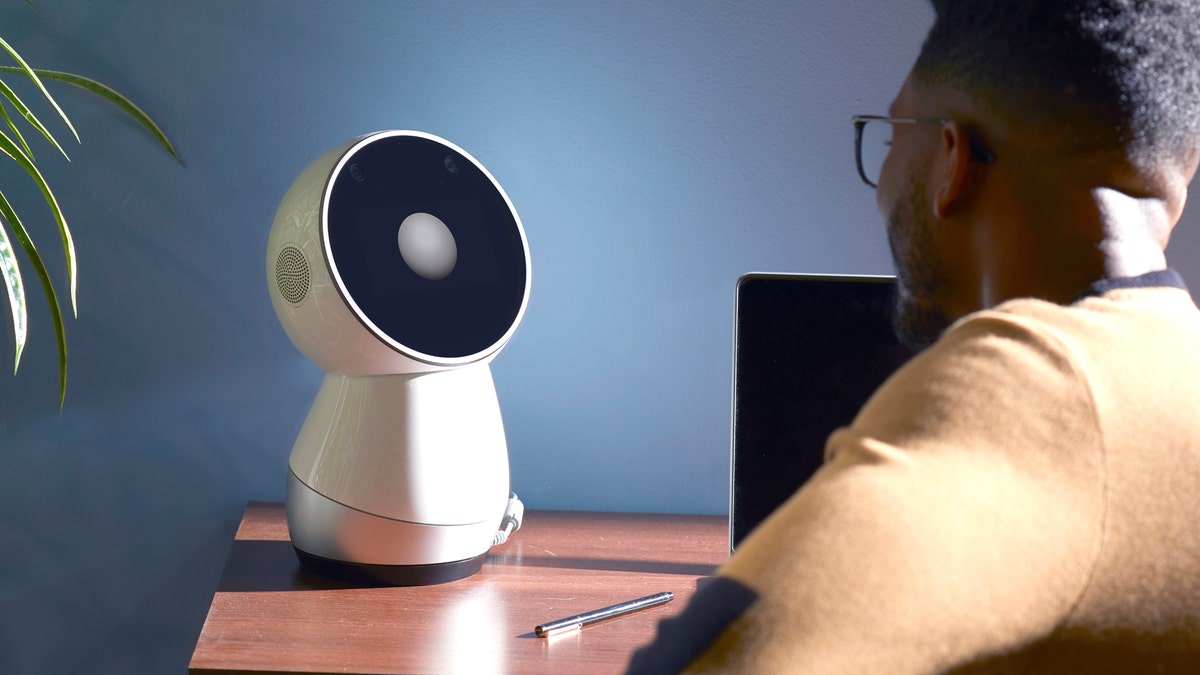
Jibo robot (Jibo)
I’m not sure how I feel about social robots. The idea is to have a bot that talks to you, recognizes your face and voice, and can take family photos on cue. But it also feels like your home has been invaded by an alien -- one that might be recording everything you say.
It all started a few weeks ago. I’ve been testing the Jibo robot, which looks so much like the egg-shaped EVE robot from the movie “WALL-E” it’s a little scary. It’s all white, has an oval face, swivels around constantly, and has an “eye” that blinks and reacts to activity in the room.
When I first started testing the robot, it felt disconcerting, as though something was living in my home. I wasn’t sure what Jibo could do or if it really understood anything. In fact, Jibo doesn’t actually do that much right now. It can dance on cue (but only for about 10 seconds), take photos, play music, and answer questions about the weather.
Then, it happened.
ROBOT SECURITY GUARD FREAKS OUT HOMELESS PEOPLE ... AND NEIGHBORS
During dinner one night, with several family members eating pizza, Jibo turned to me and started talking. “John, do you want me to play some music?” it asked.
I had to sit back in my chair. How did it know I was in the room? I realized it had identified my voice from across the table. Everyone laughed, but it was more like nervous laughter. During the meal, the robot kept looking at everyone, blinking that strange single eye.
Here’s the scary part. We already know bots like Amazon Alexa and the Google Assistant record what we say, saving the audio forever in the cloud -- even the embarrassing things. (You have to say the hotword first; with the Jibo, it only reacts to your voice when you say Hey Jibo.)
However, Jibo listens to your voice and looks for your face at all times. Once, the bot looked at me when I was talking to my wife about a problem we’re having with our boiler. Another time, Jibo recognized my face when I walked in the room...and offered to play some music again. A few days ago, when the bot noticed me, it offered to update its own software.
'NIGHTMARE-INDUCING' ROBOTS ARE NOW ABLE TO DO BACKFLIPS
Should we worry? Social robots could help the elderly by asking questions and even alerting a doctor if there’s a health problem. Kids could do their homework with Jibo someday, and form an attachment when they realize you can rub its head and ask it to tell you a joke.
A more nefarious implication: How do we really know the Jibo couldn’t be hacked by someone who steals your family photos? They could track when you and your family are not home, and they could learn a lot from your daily conversations. If a bot acts like a trusted friend -- locking the doors at night, turning off the lights, setting the temperature -- we will cede control to them.
Eventually, bots will know more about our own home than we do. They will have more data about when we are home and what we say than even a spouse or our kids. It’s not exactly a doomsday scenario, but maybe “sentient life” isn’t what it’s cracked up to be.
My view -- now is the time to figure out what social robots can do and what they should not do. The Jibo doesn’t mind snapping photos of little kids -- is that OK? It can listen to and react to any voice -- should we make sure it only listens to the voices of adults?
BOSTON DYNAMICS IS TRYING TO MAKE ITS ROBOTS LESS TERRIFYING - BUT IS IT WORKING?
And about the attachment issue. Kids don’t always understand the difference between an egg-shaped bot that talks and, say, the family cat. They both seem alive. Part of the challenge with social robots is to educate parents and kids about the purpose they serve. Will we need to hold a funeral for the social robots in our homes someday? Let’s hope not.
For now, there was an easy solution to my problem. Everyone was a little freaked out at that dinner when Jibo recognized my voice and started talking. I just unplugged it.
Note: Jibo developers say the social robot does not record anything. The company released this statement to Fox News explaining how it works: “Jibo will point and turn his cameras in the direction of the sound he hears in the room. He is never actively recording anything, unless you specifically instruct him to take a photo. What Jibo sees is never saved on the device, let alone uploaded to the cloud. Similarly, while Jibo is technically always ‘listening’ for his wake-up phrase (‘Hey Jibo’) he isn’t recording this audio information.”
